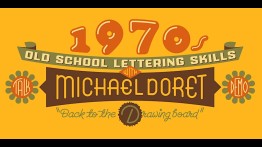1970s Old School Lettering Skills
Monday, June 17, 2024, 6:30 - 8:30pm

The Herb Lubalin Lecture Series presents a journey through the time tunnel back to the 1970s when proletariat lettering artists created their artwork using plastic circle templates, German cartridge pens, adjustable triangles, and razor blades. Contemporary designers are infatuated with lettering generated during the seventies, but have had little access to how the designs were actually produced. Norman Hathaway will interrogate Michael Doret about the training he received working under the great Ed Benguiat and how he established his technical processes as part of this free event.
Type design went crazy during the 1970s due to the introduction of photo lettering technology, and Doret got his start during the hubbub of that time. The majority of the event will be devoted to Doret demonstrating the hand skills he used during the first phase of his career. Creating tight pencil drawings from rough initial ideas, to detailed inking techniques, correcting mistakes and hand-drawn color overlays. Questions from the audience will be welcome and encouraged.
Doret's idiomatic yet appealing designs were used by Kiss, Time Magazine, Walt Disney, the US Postal Service, and the New York Knicks, His work will be displayed in the forthcoming book Growing Up in Alphabet City: The Unexpected Letterform Art of Michael Doret published by the Letterform Archive this fall.
Michael Doret grew up in Brooklyn, New York near the tattered remains of the wonderful old collection of amusement parks known as Coney Island. Inspiration for his work came from those early years near the banners, signage and brilliant colors of his Brooklyn neighborhood, and from frequently visiting Times Square where his father worked for MGM among the bright lights, billboards, and general cacophony of the "Great White Way". Similar inspiration came later from such diverse sources as matchbook covers, enamel signs, packaging, and the numerous and varied artifacts of the mid-century America of his childhood. After graduating from The Cooper Union, and after several years at different staff positions, Doret set up a design studio in New York. He has, for many years, specialized in letterform art, and an integrated approach to the disciplines of lettering, illustration and graphic design. He currently runs a studio out of his home in Pasadena, California. For many years he concentrated almost exclusively on logo and lettering projects, but in the early 2000s he expanded the base of his work to include font design. Doret’s original fonts and font families are available through his type foundry Alphabet Soup.
Norman Hathaway is an art director and design historian. He is the author of Overspray and co-author with Dan Nadel of Electrical Banana: Masters of Psychedelic Art and Dorothy and Otis: Designing the American Dream. He has led creative initiatives for institutions including The Design Museum, London and the Royal Academy of Arts, as well as artists including Paul McCartney. He has taught widely on the history of design and typography for the London College of Printing, The Royal College of Art, and Goldsmiths College.
Located in the Frederick P. Rose Auditorium, at 41 Cooper Square (on Third Avenue between 6th and 7th Streets)




